2018全国统一考试高考(全国卷II)真题英语
2018年英语高考全国卷二(含参考答案)
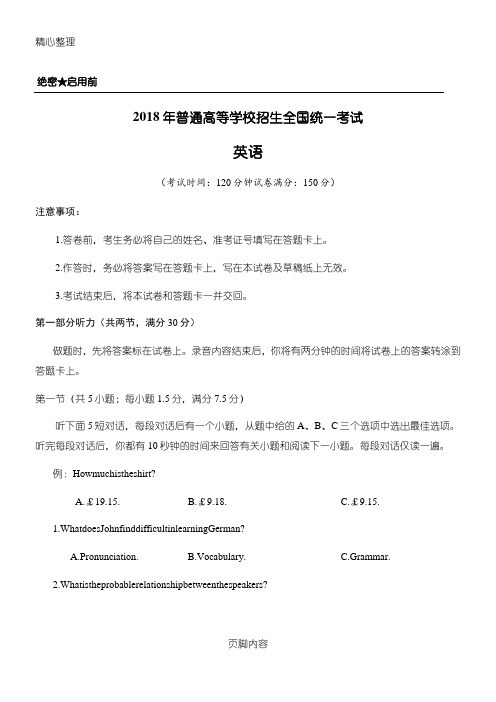
绝密★启用前2018年普通高等学校招生全国统一考试英语(考试时间:120分钟试卷满分:150分)注意事项:1.2.3.第一部分听力(共两节,满分30分)答题卡上。
第一节(共听下面A、B、C三个选项中选出最佳选项。
例:A. C.£9.15.1.WhatdoesJohnfinddifficultinlearningGerman?A.Pronunciation.B.Vocabulary.C.Grammar.2.Whatistheprobablerelationshipbetweenthespeakers?A.Colleagues.B.Brotherandsister.C.Teacherandstudent.3.Wheredoestheconversationprobablytakeplace?A.Inabank.B.Ataticketoffice.C.Onatrain.4.Whatarethespeakerstalkingabout?A.Arestaurant.B.Astreet.5.Whatdoesthewomanthinkofherinterview?A.Itwastough.第二节(共15小题;每小题1.5分,满分22.5听下面5将给出5听第6C.OnWednesday.C.Dohishomework.听第7段材料,回答第8、9题。
8.Whatdoesthemansuggestdoingatfirst?A.Goingtoaconcert.B.Watchingamovie.C.Playingacomputergame.9.Whatdothespeakersdecidetodo?A.VisitMike.B.Goboating.C.Takeawalk.听第8段材料,回答第10至12题。
10.Whichcolordocatsseebetterthanhumans?A.Red.B.Green.C.Blue.11.Whydocatsbringdeadbirdshome?A.Toeattheminasafeplace.B.Toshowofftheirhuntingskills.C.Tomaketheirownershappy.A.Grateful.B.Humorous.听第9段材料,回答第13至16题。
2018年普通高等学校招生全国统一考试(新课标全国卷Ⅱ)英语-教师用卷(1)

2018年普通高等学校招生全国统一考试(新课标全国卷Ⅱ)英语副标题一、完形填空(本大题共20小题,共30.0分)Two weeks earlier, my son, Ben, had got in touch. He’d moved to England with his mum when he was three and it had been 13 years since I’d (1) seen him. So imaginemy (2) when he emailed me saying he wanted to come to visit me.I was (3) ! I arrived early at Byron Bay where we were supposed to (4) . The baywas (5) in sunshine, and there was a group of kayakers around 150m off the shore. Getting a little (6) , I realized one kayak (皮划艇) was in (7) . “Something’s not (8) !” I took off my T-shirt and (9) into the water. I saw there were two instructors on board and a man lying across the middle. He was (10) violently. Linking arms with one of the instructors, I helped (11) the young man out of the water. He was unconscious and as I looked at his face, something (12) to me. Those brown eyes were very (13) . “What’s his name?” I asked the instructor. “Ben,” he replied, and immediately I (14) . That stranger was my son!The instructors called for an ambulance. (15) , after a brief stay in hospital, Ben was well enough to be allowed to (16) and later the family met up for dinner. We chatted about everything and then Ben (17) to me. “I just want to say thank you,” he said.“You (18) my life!”I still can’t believe what a (19) it was. I’m just so glad I was there (20) to help my son.1. A. also B. often C. even D. last2. A. delight B. relief C. anger D. worry3. A. scared B. shocked C. thrilled D. ashamed4. A. talk B. stay C. meet D. settle5. A. bathed B. clean C. deep D. formed6. A. faster B. closer C. heavier D. wiser7. A. trouble B. advance C. question D. battle8. A. real B. right C. fair D. fit9. A. stared B. sank C. dived D. fell10. A. arguing B. fighting C. shouting D. shaking11. A. lead B. persuade C. carry D. keep12. A. happened B. occurred C. applied D. appealed13. A. sharp B. pleasant C. attractive D. familiar14. A. agreed B. hesitated C. doubted D. knew15. A. Fortunately B. Frankly C. Sadly D. Suddenly16. A. return B. relax C. speak D. leave17. A. joked B. turned C. listened D. pointed18. A. created B. honored C. saved D. guided19. A. coincidence B. change C. pity D. pain20. A. on board B. in time C. for sure D. on purpose【答案】【小题1】D 【小题2】A 【小题3】C 【小题4】C 【小题5】A 【小题6】B 【小题7】A 【小题8】B 【小题9】C 【小题10】D 【小题11】C 【小题12】B 【小题13】D 【小题14】D 【小题15】A 【小题16】D 【小题17】B 【小题18】C 【小题19】A 【小题20】B 【解析】【文章大意】这是一篇记叙文,作者与儿子分离十三年,取得联系之后准备见面的时候,作者在海边救了一个小伙子,而这个年轻人竟然是他的儿子,作者感慨世事难料,认为这种巧合是冥冥之中注定的。
英语全国卷18年二卷阅读翻译
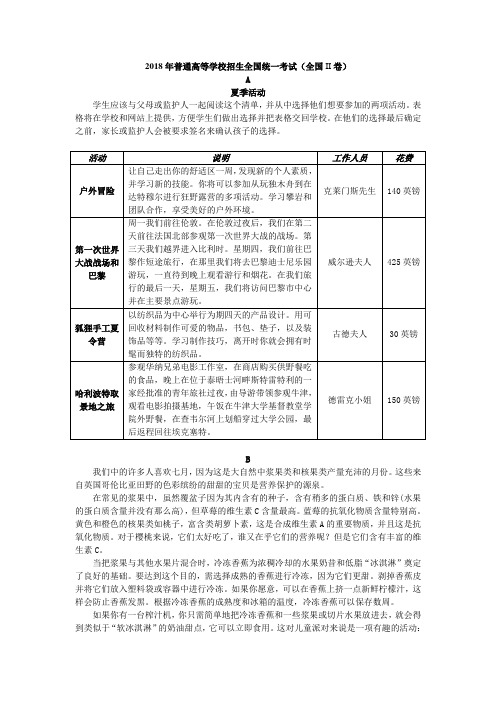
2018年普通高等学校招生全国统一考试(全国II卷)A夏季活动学生应该与父母或监护人一起阅读这个清单,并从中选择他们想要参加的两项活动。
表格将在学校和网站上提供,方便学生们做出选择并把表格交回学校。
在他们的选择最后确定之前,家长或监护人会被要求签名来确认孩子的选择。
B我们中的许多人喜欢七月,因为这是大自然中浆果类和核果类产量充沛的月份。
这些来自英国哥伦比亚田野的色彩缤纷的甜甜的宝贝是营养保护的源泉。
在常见的浆果中,虽然覆盆子因为其内含有的种子,含有稍多的蛋白质、铁和锌(水果的蛋白质含量并没有那么高),但草莓的维生素C含量最高。
蓝莓的抗氧化物质含量特别高。
黄色和橙色的核果类如桃子,富含类胡萝卜素,这是合成维生素A的重要物质,并且这是抗氧化物质。
对于樱桃来说,它们太好吃了,谁又在乎它们的营养呢?但是它们含有丰富的维生素C。
当把浆果与其他水果片混合时,冷冻香蕉为浓稠冷却的水果奶昔和低脂“冰淇淋”奠定了良好的基础。
要达到这个目的,需选择成熟的香蕉进行冷冻,因为它们更甜。
剥掉香蕉皮并将它们放入塑料袋或容器中进行冷冻。
如果你愿意,可以在香蕉上挤一点新鲜柠檬汁,这样会防止香蕉发黑。
根据冷冻香蕉的成熟度和冰箱的温度,冷冻香蕉可以保存数周。
如果你有一台榨汁机,你只需简单地把冷冻香蕉和一些浆果或切片水果放进去,就会得到类似于“软冰淇淋”的奶油甜点,它可以立即食用。
这对儿童派对来说是一项有趣的活动:他们喜欢将水果和冷冻香蕉送入机器顶部,然后看到冰淇淋从榨汁机底部出现。
C本篇译文见答案与详解第8页D我们就在那里:在电梯里,在银行里排队或在飞机上,周围都是像我们一样的人,他们深深地关注着他们的智能手机,或者更糟糕的是,他们正挣扎于尴尬的沉默气氛中。
问题在哪里呢?很可能我们都对自己的口才做了妥协。
更可能的是我们没人主动攀谈,因为这很尴尬并且具有挑战性,或者我们认为这很烦人并且没有必要。
但是下一次你发现自己处在一群陌生人中间时,考虑一下聊聊天是值得的。
2018高考英语试题全国卷及答案.doc

绝密★启用前2018年普通高等学校招生全国统一考试英语第一部分:听力(共两节,满分30分)第一节(共5小题:每小题1.5分,满分7.5分)1.What is the man going to do?A.Open the window. B.Find another room. C.Go out with the woman.2.What do we know about Peter Schmidt?A.He has lost his ticket. B.He is expecting a ticket. C.He went out to buy a ticket.3.What do we know about mother and son?A.She wants to tell him the result of the game.B.She doesn’t like him to watch TV.C.She knows which team he supports.4.What are the speakers talking about?A.Exam results. B.Time for the exam. C.Change of class hours.5.What will the woman tell the man?A.Her company’s name.B.Her new address. C.Her phone number.第二节(共15小题:每小题1.5分,满分22.5分)6.What is the possible relationship between the woman and the man?A.Wife and husband. B.Doctor and patient. C.Boss and secretary 7.What does the woman think about the man?A.He is not good to the children.B.He is not telling the truth.C.He sleeps too much.8.Where does the woman want to go?A.An office. B.A fruit shop. C.A police station. 9.What does the woman have to do now?A.Wait for Mark at the crossroads.B.Walk ahead and turn right.C.Walk a little way back.10.What exactly does the man want to find out?A.What people think of the bus service.B.How many people are using the bus service.C.Which group of people use the bus service most often.11.What does the woman say about the bus service?A.The distance between bus stops is too long.B.The bus timetables are full of mistakes.C.Buses are often not on time.12.Why does the woman say her husband is fortunate?A.He often goes to work in a friend’s car.B.He doesn’t need to go shopping by bus.C.He lives close to the bus station.13.What is the probable relationship between the two speakers?A.Salesperson and customerB.Old school friendsC.Fellow workers14.What do we know about the woman?A.She is fond of her work. B.She is tired of traveling. C.She is interested in law.15.What is the man?A.A company manager. B.A salesperson. C.A lawyer.16.Why does the woman ask for the man’s address?A.To send him a book.B.To get together with him.C.To repair something at his home.17.What is the aim of the program?A.To keep trainees in shape.B.To improve public relations.C.To develop leadership skills.18.Which of the following will the trainess be doing during the program?A.Attenling lectures on managementB.Preparing reports for the company.C.Making plans for a journey.19.How long will the program last?A.8 days B.12 days C.20 days.20.If people want to join the program, what should they do after the meeting?A.Take a pre-test B.Pay for the program. C.Sign on a piece of paper.第二部分:英语知识运用(共两节,满分45分)第一节:单项填空(共15小题:每小题1分,满分15分)21.Don’t be afraid of asking for help it is needed.A.unless B.since C.although D.when22.A cook will be immediately fired if he is found in the kitchen.A.smoke B.smoking C.to smoke D.smoked23.Allen had to call a taxi because the box was to carry all the way home.A.much too heavy B.too much heavy C.heavy too much D.too heavy much24.—Sorry, Joe, I didn’t mean to…—Don’t call me “Joe”. I’m Mr Parker to you, and you forget it!A.do B.didn’t C.did D.don’t25.If anybody calls, tell them I’m out, and ask them to their name and address.A.pass B.write C.take D.leave26.The sign reads “In case of fire, break the glass and push red button.”A.不填;a B.不填;the C.the; the D.a;a27.All morning as she waited for the medical report from the doctor, hernervouseness .A.has grown B.is growing C.grew D.had grown28.A left luggage office is a place where bags be left for a short time, especially at a railway station.A.should B.can C.must D.will29.We’re going to the bookstore in John’s car. You can come with us you can meet us there later.A.but B.and C.or D.then30.Why don’t you put the meat in the fridge? It will fresh for several days.A.be stayed B.stay C.be staying D.have stayed31.News reports say peace talks between the two countries with no agreement reached.A.have broken down B.have broken out C.have broken in D.have broken up32.—There’s coffee and tea: you can have .—Thanks.A.either B.each C.one D.it33.—Susan, go and join your sister cleaning the yard.—Why ? John is sitting there doing nothing.A.him B.he C.I D.me34.The old couple have been married for 40 years and never once with each other.A.they had quarreled B.they have quarreledC.have they quarreled D.had they quarreled35.—I think you should phone Jenny and say sorry to her.— .It was her fault.A.No way B.Not possible C.No chance D.Not at all第二节:完形填空(共20小题:每小题1.5分,满分30分)阅读下面短文,掌握其大意,然后从36—55各题所给的四个选项(A、B、C和D)中,选出最佳选项。
2018年高考英语全国卷2-答案

2018年普通高等学校招生全国统一考试英语答案解析第一部分听力第一节1.【答案】C2.【答案】A3.【答案】B4.【答案】A5.【答案】C第二节6.【答案】B7.【答案】B8.【答案】A9.【答案】C10.【答案】C11.【答案】A12.【答案】B13.【答案】A14.【答案】B15.【答案】C16.【答案】A17.【答案】B18.【答案】C19.【答案】C20.【答案】A第二部分阅读理解第一节21.【答案】A【解析】细节理解题。
根据题干中的go camping,我们可以迅速浏览到第一个活动当中的wild camping这个关键信息,并锁定答案为A。
22.【答案】D【解析】细节理解题。
根据题干中的with Wilson,我们首先就知道具体信息要从第二个活动中找,然后根据On Monday we travel to London. After staying overnight in London, we travel on Day 2 to northern France to visit the World War I battle fields判定周二,也就是第二天到法国北部去参观一战的战场,故选D。
23.【答案】A【解析】细节理解题。
根据题干中的信息Potty about Potter,可知应该从最后一种活动来寻找答案。
关键信息overnight意为“一夜的逗留”,因此这个活动是持续两天,故选A。
24.【答案】C【解析】细节理解题。
根据第二段中As for cherries, they are so delicious who cares?可知作者在乎的是樱桃的美味,故选C。
25.【答案】B【解析】细节理解题。
根据第三段中的If you like, a squeeze of fresh lemon juice on the bananas will prevent them turning brown.可知往香蕉上滴新鲜的柠檬汁是为了防止香蕉变成褐色,也就是新鲜的柠檬汁是被用来保持香蕉颜色的,故选B。
2018年全国普通高等学校招生统一考试试卷 英语(全国II卷)

2018年全国普通高等院校招生统一考试试卷(全国II卷)英语第一部分听力(共两节,满分30分)(略)第二部分阅读理解(共两节.满分40分)第一节(共15小题;每小题2分,满分30分)阅读下列短文,从每题所给的A、B、C和D四个选项中,选出最佳选项。
ASummer ActivitiesStudents should read the list with their parents/carers, and select two activities they would like to do. Forms will be available in school and online for them to indicate their choices and return to school. Before choices are finalised, parents/carers will be asked to sign to confirm their child’s choices.A. OUT.B. WBP.C. CRF.D. POT.22. What will the students do on Tuesday with Mrs. Wilson?A. Travel to London.B. See a parade and fireworks.C. Tour central Paris.D. Visit the WWI battlefields.23. How long does Potty about Potter last?A. Tow days.B. Four days.C. Five days.D. One week.BMany of us love July because it’s the month when nature’s berried and stone fruits are in abundance. These colourful and sweet jewels from British Columbia’s fields are little powerhouses of nutritional protection.Of the common berries, strawberries are highest in vitamin C, although, because of their seeds, raspberries contain a little more protein (蛋白质), iron and zinc (not that fruits have much protein). Blueberries are particularly high in antioxidants (抗氧化物质). The yellow and orange stone fruits such as peaches are high in the carotenoids we turn into vitamin A and which are antioxidants. As for cherries (樱桃), they are so delicious who cares? However, they are rich in vitamin C.When combined with berries or slices of other fruits, frozen bananas make an excellent base thick for thick, cooling fruit shakes and low fat “ice cream”. For this purpose, select ripe bananas for freezing as they are much sweeter. Remove the skin and place them in plastic bags or containers and freeze. If you like, a squeeze of fresh lemon juice on the bananas will prevent them turning brown. Frozen bananas will last several weeks, depending on their ripeness and the temperature of the freezer.If you have a juicer, you can simply feed in frozen bananas and some berries or sliced fruit. Out comes a “soft-serve” creamy dessert, to be eaten right away. This makes a fun activity for a children’s party; they love feeding the fruit and frozen bananas into the top of the machine and watching the ice cream come out below.24. What does the author seem to like about cherries?A. They contain protein.B. They are high in vitamin A.C. They have a pleasant taste.D. They are rich in antioxidants.25. Why is fresh lemon juice used in freezing bananas?A. To make them smell better.B. To keep their colour.C. To speed their ripening.D. To improve their nutrition.26. What is “a juicer” in the last paragraph?A. A dessert.B. A drink.C. A container.D. A machine.27. From which is the text probably taken?A. A biology textbook.B. A healthy magazine.C. A research paper.D. A travel brochureCTeens and younger children are reading a lot less for fun, according to a Common Sense Media report published Monday.While the decline over the past decades is steep for teen readers, some data in the report shows that reading remains a big part of many children’s lives, and indicates how parents might help encourage more reading.According to the report’s key findings, “the proportion (比例) who say they ‘hardly ever’reads for fun has gone from 8 percent of 13-year-olds and 9 percent of 17-year-olds in 1984 to 22 percent and 27 percent respectively today.”The report data shows that pleasure reading levels for younger children, ages 2-8, remainlargely the same. But the amount of time spent in reading each session has declined, from closer to an hour or more to a half hour per session.When it comes to technology and reading, the report does little to counsel (建议) parents looking for data about the effect of e-readers and tablets on reading. It does point out that many parents still limit electronic reading, mainly due to concerns about increased screen time.The most hopeful data shared in the report shows clear evidence of parents serving as examples and important guides for their kids when it comes to reading. Data shows that kids and teens who do read frequently, compared to infrequent readers, have more books in the home, more books purchased for them, parents who read more often, and parents who set aside time for them to read.As the end of school approaches, and school vacation reading list loom (逼近) ahead, parents might take this chance to step in and make their own summer reading list and plan a family trip to the library or bookstore.28. What is the Common Sense Media report probably about?A. Children’s reading habits.B. Quality of children’s books.C. Children’s after-class activities.D. Parent-child relationships.29. Where can you find the data that best supports “children are reading a lot less for fun”?A. In paragraph 2.B. In paragraph 3.C. In paragraph 4.D. In paragraph 5.30. Why do many parents limit electronic reading?A. E-books are of poor quality.B. It could be a waste of time.C. It may harm children’s health.D. E-readers are expensive.31. How should parents encourage their children to read more?A. Act as role models for them.B. Ask them to write book reports.C. Set up reading groups for them. Talk with their reading class teachers.DWe’ve all been there: in a lift, in line at the bank or on an airplane, surrounded by people who are, like us, deeply focused on their smartphones or, worse, struggling with the uncomfortable silence.What’ the problem? It’s possible that we all have compromised conversational intelligence. It’s more likely that none of us start a conversation because it’s awkward and challenging, or we think it’s annoying and unnecessary. But the next time you find yourself among strangers, consider that small talk is worth the trouble. Experts say it’s an invaluable social practice that result in big benefitsDismissing small talk as unimportant is easy, but we can’t forget that deep relationships wouldn’t even exist if it were for casual conversation. Small talk is the grease (润滑剂) for social communication, says Bernardo Carducci, director of the Shyness Research Institute at Indiana University Southeast. “Almost every great love story and each big business deal begins with small talk,” he explains. “The key to successful small talk is learning how to connect with others, not just communicate with them.”In a 2014 study, Elizabeth Dunn, associate professor of psychology at UBC, invited people on their way into a coffee shop. One group was asked to seek out an interaction (互动) with its waiter; the other, to speak only when necessary. The result showed that those who chatted with their server reported significantly higher positive feeling and a better coffee shop experience. “It’snot that talking to the waiter is better than talking to your husband,” says Dunn. “But interactions with peripheral (边缘的) members of our social network matter for our well-being also.”Dunn believes that people who reach out to strangers feel a significantly greater sense of belonging, a bond with others. Carducci believes developing such a sense of belonging starts with small talk. “Small talk is the basis of good manners,” he says.32. What phenomenon is described in the first paragraph?A. Addiction to smartphones.B. inappropriate behaviours in public places.C. Absence of communication between strangers.D. Impatience with slow service.33. What is important for successful small talk according to Carducci?A. Showing good manners.B. Relating to other people.C. Focusing on a topic.D. Making business deals.34. What does the coffee-shop study suggest about small talk?A. It improves family relationships.B. It raises people’s confidence.C. It matters as much as a formal talk.D. It makes people feel good.35. What is the best title for the text?A. Conversation CountsB. Way of Making Small TalkC. Benefits of Small TalkD. Uncomfortable Silence第二节(共5小题:每小题2分,满分10分)根据短文内容,从短文后的选项中选出能填入空白处的最佳选项。
2018年高考英语全国2卷真题及答案(word版) 含写作和详细解析
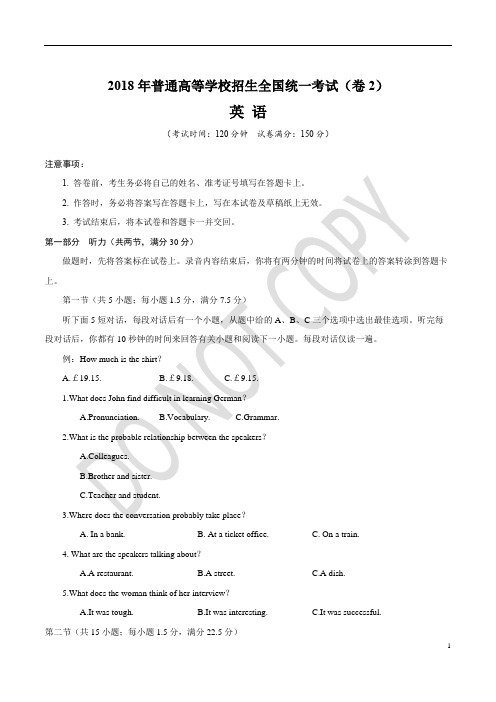
2018年普通高等学校招生全国统一考试(卷2)英语(考试时间:120分钟试卷满分:150分)注意事项:1. 答卷前,考生务必将自己的姓名、准考证号填写在答题卡上。
2. 作答时,务必将答案写在答题卡上,写在本试卷及草稿纸上无效。
3. 考试结束后,将本试卷和答题卡一并交回。
第一部分听力(共两节,满分30分)做题时,先将答案标在试卷上。
录音内容结束后,你将有两分钟的时间将试卷上的答案转涂到答题卡上。
第一节(共5小题;每小题1.5分,满分7.5分)听下面5短对话,每段对话后有一个小题,从题中给的A、B、C三个选项中选出最佳选项。
听完每段对话后,你都有10秒钟的时间来回答有关小题和阅读下一小题。
每段对话仅读一遍。
例:How much is the shirt?A.£19.15.B.£9.18.C.£9.15.1.What does John find difficult in learning German?A.Pronunciation.B.Vocabulary.C.Grammar.2.What is the probable relationship between the speakers?A.Colleagues.B.Brother and sister.C.Teacher and student.3.Where does the conversation probably take place?A. In a bank.B. At a ticket office.C. On a train.4. What are the speakers talking about?A.A restaurant.B.A street.C.A dish.5.What does the woman think of her interview?A.It was tough.B.It was interesting.C.It was successful.第二节(共15小题;每小题1.5分,满分22.5分)听下面5段对话或独白,每段对话或独白后有几个小题,从题中所给的A、B、C三个选项中选出最佳选项。
2018年10月高等教育自学考试全国统一命题考试英语(二)试卷(课程代码00015)及答案
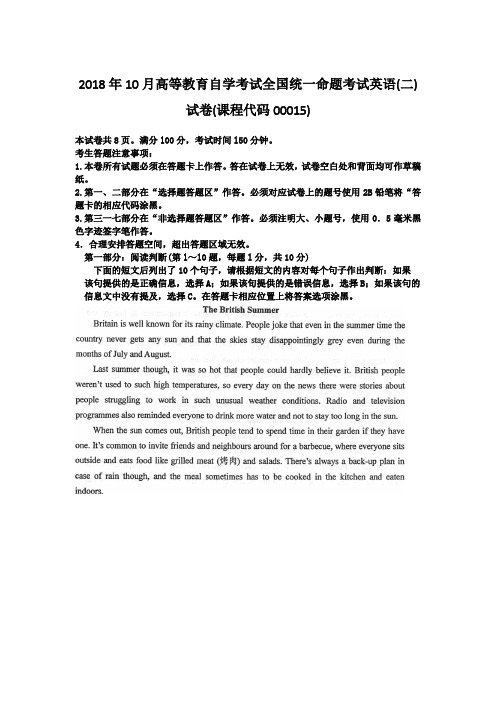
2018年10月高等教育自学考试全国统一命题考试英语(二)试卷(课程代码00015)本试卷共8页。
满分l00分,考试时间l50分钟。
考生答题注意事项:1.本卷所有试题必须在答题卡上作答。
答在试卷上无效,试卷空白处和背面均可作草稿纸。
2.第一、二部分在“选择题答题区”作答。
必须对应试卷上的题号使用2B铅笔将“答题卡的相应代码涂黑。
3.第三一七部分在“非选择题答题区”作答。
必须注明大、小题号,使用0.5毫米黑色字迹签字笔作答。
4.合理安排答题空间,超出答题区域无效。
第一部分:阅读判断(第l~l0题,每题l分,共10分)下面的短文后列出了10个句子,请根据短文的内容对每个句子作出判断:如果该句提供的是正确信息,选择A;如果该旬提供的是错误信息,选择B;如果该句的信息文中没有提及,选择C。
在答题卡相应位置上将答案选项涂黑。
第二部分:阅渎选择(第11~15题,每题2分,共l0分)阅渎下面短文,请从短文后所给各题的4个选项(A、B、C、D)中选出1个最佳选项,并在答题卡相应位置上将该项涂黑。
第三部分:概括段落大意和补全句子(第16~25题,每题l分,共10分) 阅读下面短文,请完成短文后的2项测试任务:(1)从第l6~20题后所给的6个选项中为第1~5段每段选择1个正确的小标题;(2)从第21~25题后所给的6个选项中选择5个正确选项,分别完成每个句子。
请将正确选项的字母写在答题卡上。
第四部分:填句补文(第26~30题,每题2分,共10分)下面的短文有5处空自,短文后有6个句子,其中5个取自短文,请根据短文内容将其分别放回原有位置,以恢复文章原貌,请将正确选项的字母写在答题卡上。
第五部分:填词补文(第31~40题,每题l.5分,共I5分)下面的短文有l0处空白,短文后列出12个词,其中10个取自短文,请根据短文内容将其分别放回原有位置,以恢复文章原貌,请将正确选项的字母写在答题卡上。
第六部分:完形补文(第41~50题,每题l.5分,共l5分)下面的短文有l0处空白,每处空白后的括号内有一个词,请根据短文内容将其正确的形式填入文中,以恢复文章原貌,并将答案写在答题卡相应的位置上。
2018年高考英语全国2卷试题及 答案
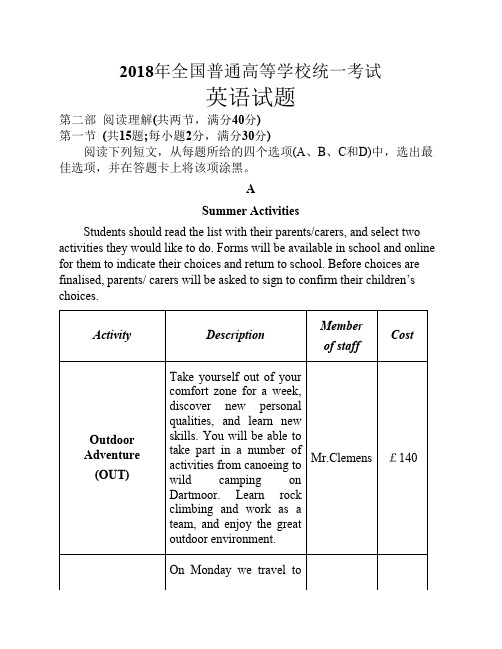
2018年全国普通高等学校统一考试英语试题第二部阅读理解(共两节,满分40分)第一节 (共15题;每小题2分,满分30分)阅读下列短文,从每题所给的四个选项(A、B、C和D)中,选出最佳选项,并在答题卡上将该项涂黑。
ASummer ActivitiesStudents should read the list with their parents/carers, and select two activities they would like to do. Forms will be available in school and online for them to indicate their choices and return to school. Before choices are finalised, parents/ carers will be asked to sign to confirm their children’s choices.Activity Description Memberof staffCostOutdoor Adventure (OUT)Take yourself out of yourcomfort zone for a week,discover new personalqualities, and learn newskills. You will be able totake part in a number ofactivities from canoeing towild camping onDartmoor. Learn rockclimbing and work as ateam, and enjoy the greatoutdoor environment.Mr.Clemens£140 On Monday we travel toWWⅠBattlefields and Paris (WBP)London. After stayingovernight in London, wetravel on Day 2 tonorthern France to visitthe World WarⅠbattlefields. On day 3we cross into Belgium.Thursday sees us make theshort journey to Pariswhere we will visitDisneyland Paris park,staying until late to see theparade and the fireworks.Our final day, Friday, seesus visit central Paris andtour the main sights.Mrs. Wilson£425Crafty foxes (CRF)Four days of productdesign centred aroundtextiles. Making lovelyobjects using recycled andmade materials. Bags,cushion and decorations…Learn skills and leavewith modern and unusualtextiles.Mrs. Goode£30Potty about Potter (POT)Visit Warner Bros Studio,shop stop to buy picnic,stay overnight in anapproved Youth Hostel inStreatly-on-Thames,guided tour of Oxford tosee the film locations,picnic lunch outsideMiss Drake£150Oxford's Christchurch,boating on the RiverCherwell through theUniversity Parks, beforeheading back to Exeter.21. Which activity will you choose if you want to go camping?A. OUT.B. WBP.C. CRF.D.POT.22. What will the students do on Tuesday with Mrs. Wilson?A. Travel to LondonB. see a parade and fireworks.C. Tour central Paris.D. Visit the WWI battlefields.23. How long does Potty about Potter last?A. Two days.B. Four daysC. Five daysD. One week.BMany of us love July because it’s the month when nature’s berries and stone fruits are in abundance. These colorful and sweet jewels from British Columbia’s fields are little powerhouses of nutritional protection.Of the common berries, strawberries are highest in vitamin C, although, because of their seeds, raspberries contain a little more protein(蛋白质), iron and zinc (not that fruits have much protein). Blueberries are particularly high in antioxidants (抗氧化物质). The yellow and orange stone fruits such as peaches are high in the carotenoids we turn into Vitamin A and which are antioxidants. As for cherries(樱桃), they are so delicious who care? However, they are rich in Vitamin C.When combined with berries or slices of other fruits, frozen bananas make an excellent base for thick, cooling fruits shakes and low fat “ice cream”. For this purpose, select ripe bananas for freezing as they are much sweeter. Remove the skin and place them in plastic bags or containers and freeze. If you like, a squeeze of fresh lemon juice on the bananas will prevent them turning brown. Frozen bananas will last several weeks, depending on their ripeness and the temperature of the freezer.If you have a juicer, you can simply feed in frozen bananas and some berries or sliced fruit. Out comes a “Soft-serve” creamy dessert, to be eatenright away. This makes a fun activity for a children’s party; they love feeding the fruit and frozen bananas into the top of the machine and watching the ice cream come out below.24. What does the author seem to like about cherries?A. They contain protein.B. They are high in vitamin A.C. They have a pleasant taste.D. They are rich in antioxidants.25. Why is fresh lemon juice used in freezing bananas?A. To make them smell better.B. To keep their colour.C. To speed up their ripening.D. To improve their nutrition.24. What is “a juicer” in the last paragraph?A. A dessert.B. A drink.C. A container.D. A machine.25. From which is the text probably taken?A. A biology textbook.B. A health magazine.C. A research paper. C. A travel brochure.CTeens and younger children are reading a lot less for fun, according to a Common Sense Media report published Monday.While the decline over the past decade is steep for teen readers, some data in the report shows that reading remains a big part of many children’s lives, and indicates how parents might help encourage more reading.According to the report’s key findings, “the proportion (比例) who say they ‘hardly ever’ read for fun has gone from 8 percent of 13-year-olds and 9 percent of 17-year-olds in 1984 to 22 percent and 27 percent respectively today.”The report data shows that pleasure reading levels for younger children, ages 2-8, remain largely the same. But the amount of time spent in reading each session had declined, from closer to an hour or more to closer to a half hour per session.When it comes to technology and reading, the report does little to counsel (建议) parents looking for data about the effect of e-readers and tablets on reading. It does point out that many parents still limit electronic reading mainly due to concerns about increased screen time.The most hopeful data shared in the report shows clear evidence of parents serving as examples and important guides for their kids when it comes to reading. Data shows that kids and teens who do read frequently, compared to infrequent readers, have more books in the home, more books purchased for them, parents who read more often, and parents who set aside time for them to read.At the end of school approaches, and school vacation reading lists loom(逼近) ahead, parents might take the chance to step in and make their own summer reading list and plan a family trip to the library or bookstore.28. What is the Common Sense Media report probably about?A. Children’s reading habits.B. Quality of children’s books.C. Children’s after-class activities.D. Parent-child relationships.29. Where can you find the data that best supports “children are reading alot less for fun”?A. In paragraph 2B. In paragraph 3C. In paragraph 4D. Inparagraph 530. Why do many parents limit electronic reading?A. E-books are of poor quality.B. It could be a waste of time.C. It may harm children’s health.D. E-readers are expensive.31. How should parents encourage their children to read more?A. Act as role models for them.B. Ask them to write bookreports.C. Set up reading groups for them.D. Talk with their reading class teachers.DWe’ve been there: in a lift, in line at the bank or on an airplane, surrounded by people who are, like us, deeply focused on their smartphones or, worse, struggling with the uncomfortable silence.What’s the problem? It is possible that we all have compromisedconversational intelligence. It’s more likely that none of us start a conversation because it’s awkward and challenging, or we think it’s annoying and unnecessary. But the next time you find yourself among strangers, consider that small talk is worth the trouble. Experts say it’s an invaluable social practice that results in big benefits.Dismissing small talk as unimportant is easy, but we can’t forget that deep relationships wouldn’t even exist if it weren’t for casual conversation. Small talk is the grease (润滑剂) for social communication, says Bernardo Carducci, director of the Shyness Research Institute at Indian University Southeast. “Almost every great love story and each big business deal begins with small talk,” he explains. “The key to successful small talk is learning how to connect with others, not just communicate with them.”In a 2014 study, Elizabeth Dunn, associate professor of psychology at UBC, invited people on their way into a coffee shop. One group was asked to seek out an interaction (互动) with its waiter; the other, to speak only when necessary. The results showed that those who chatted with their server reported significantly higher positive feelings and a better coffee shop experience. “It’s not that talking to the waiter is better than talking to your husband,” say Dunn. “But interactions with peripheral (边缘的) members of our social network matter for our well-being also.”Dunn believes that people who research out to strangers feel a significantly greater sense of belonging, a bond with others. Carducci believes developing such a sense of belonging starts with small talk. “Small talk is the basis of good manners,” he says.32. What phenomenon is described in the first paragraph?A. Addiction to smartphones.B. Inappropriate behaviours in public places.C. Absence of communication between strangers.D. Impatience with slow service.33. What is important for successful small talk according to Carducci?A. Showing good manners.B. Relating to other people.C. Focusing on a topic.D. Making business deals.34. What does the coffee-shop study suggest about small talk?A. It improves family relationships.B. It raises people’s confidence.C. It matters as much as a formal talk.D. It makes people feel good.35. What is the best title for the text?A. Conversation CountsB. Ways of Making Small TalkC. Benefits of Small TalkD. Uncomfortable Silence第二节(共5小题;每小题2分,共10分)根据短文内容,从短文后的七个选项中选出能填入空白处的最佳选项。
(完整)2018高考全国卷2,3英语听力试题及原文
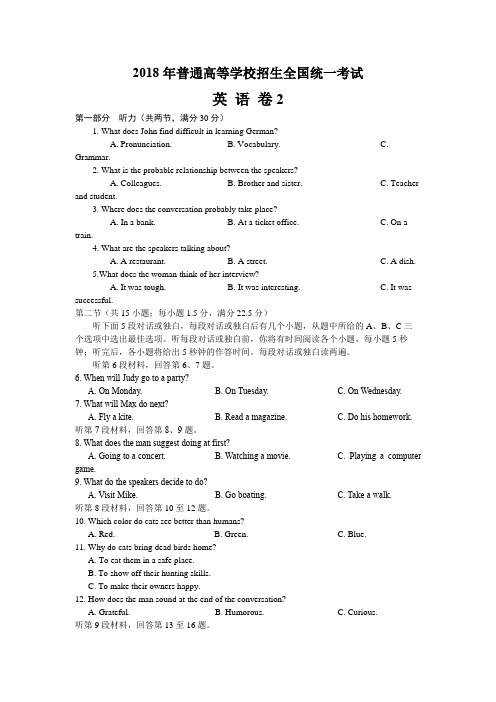
2018年普通高等学校招生全国统一考试英语卷2第一部分听力(共两节,满分30分)1. What does John find difficult in learning German?A. Pronunciation.B. Vocabulary.C. Grammar.2. What is the probable relationship between the speakers?A. Colleagues.B. Brother and sister.C. Teacher and student.3. Where does the conversation probably take place?A. In a bank.B. At a ticket office.C. On a train.4. What are the speakers talking about?A. A restaurant.B. A street.C. A dish.5.What does the woman think of her interview?A. It was tough.B. It was interesting.C. It was successful.第二节(共15小题;每小题1.5分,满分22.5分)听下面5段对话或独白,每段对话或独白后有几个小题,从题中所给的A、B、C三个选项中选出最佳选项。
听每段对话或独白前,你将有时间阅读各个小题,每小题5秒钟;听完后,各小题将给出5秒钟的作答时间。
每段对话或独白读两遍。
听第6段材料,回答第6、7题。
6. When will Judy go to a party?A. On Monday.B. On Tuesday.C. On Wednesday.7. What will Max do next?A. Fly a kite.B. Read a magazine.C. Do his homework.听第7段材料,回答第8、9题。
2018年英语高考全国卷二(含参考答案)

绝密★启用前2018年普通高等学校招生全国统一考试英语(考试时间:120分钟试卷满分:150分)注意事项:1.2.3.第一部分听力(共两节,满分30分)答题卡上。
第一节(共听下面A、B、C三个选项中选出最佳选项。
例:A. C.£9.15.1.WhatdoesJohnfinddifficultinlearningGerman?A.Pronunciation.B.Vocabulary.C.Grammar.2.Whatistheprobablerelationshipbetweenthespeakers?A.Colleagues.B.Brotherandsister.C.Teacherandstudent.3.Wheredoestheconversationprobablytakeplace?A.Inabank.B.Ataticketoffice.C.Onatrain.4.Whatarethespeakerstalkingabout?A.Arestaurant.B.Astreet.5.Whatdoesthewomanthinkofherinterview?A.Itwastough.第二节(共15小题;每小题1.5分,满分22.5听下面5将给出5听第6C.OnWednesday.C.Dohishomework.听第7段材料,回答第8、9题。
8.Whatdoesthemansuggestdoingatfirst?A.Goingtoaconcert.B.Watchingamovie.C.Playingacomputergame.9.Whatdothespeakersdecidetodo?A.VisitMike.B.Goboating.C.Takeawalk.听第8段材料,回答第10至12题。
10.Whichcolordocatsseebetterthanhumans?A.Red.B.Green.C.Blue.11.Whydocatsbringdeadbirdshome?A.Toeattheminasafeplace.B.Toshowofftheirhuntingskills.C.Tomaketheirownershappy.A.Grateful.B.Humorous.听第9段材料,回答第13至16题。
2018英语二真题答案与解析-凯程首发
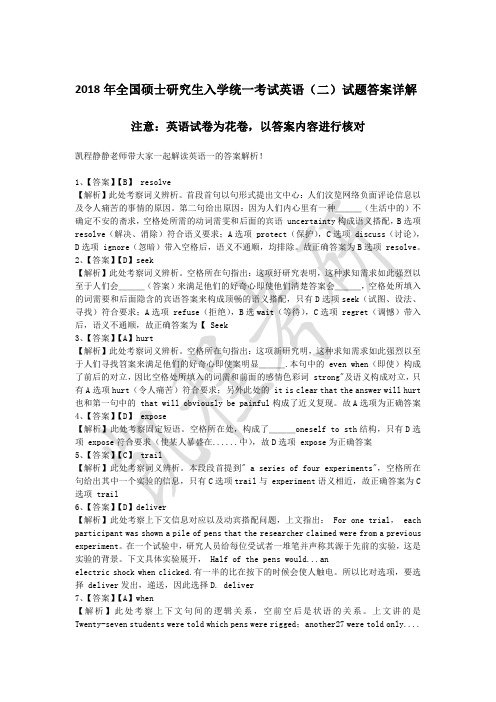
2018年全国硕士研究生入学统一考试英语(二)试题答案详解注意:英语试卷为花卷,以答案内容进行核对凯程静静老师带大家一起解读英语一的答案解析!1、【答案】【B】resolve【解析】此处考察词义辨析。
首段首句以句形式提出文中心:人们汶览网络负面评论信息以及令人痛苦的事情的原因。
第二句给出原因:因为人们内心里有一种___(生活中的)不确定不安的斋求,空格处所需的动词需雯和后面的宾语uncertainty构成语义搭配,B选项resolve(解决、消除)符合语义要求;A选项protect(保护),C选项discuss(讨论),D选项ignore(忽暗)带入空格后,语义不通顺,均排除。
故正确答案为B选项resolve。
2、【答案】【D】seek【解析】此处考察词义辨析。
空格所在句指出:这项紆研究表明,这种求知需求如此强烈以至于人们会___(答案)来满足他们的好奇心即使他们清楚答案会___,空格处所填入的词需要和后面隐含的宾语答案来构成顶畅的语义搭配,只有D选项seek(试图、设法、寻找)符合要求;A选项refuse(拒绝),B选wait(等待),C选项regret(调憾)带入后,语义不通顺,故正确答案为【Seek3、【答案】【A】hurt【解析】此处考察词义辨析。
空格所在句指出:这项新硏究明,这种求知需求如此强烈以至于人们寻找笤案来满足他们的好奇心即使案明显___.本句中的even when(即使)构成了前后的对立,因比空格处所填入的词需和前面的感情色彩词strong"及语义构成对立,只有A选项hurt(令人痛苦)符合要求;另外此处的it is clear that the answer will hurt 也和第一句中的that will obviously be painful构成了近义复现。
故A选项为正确答案4、【答案】【D】expose【解析】此处考察固定短语。
空格所在处,构成了___oneself to sth结构,只有D选项expose符合要求(使某人暴盛在......中),故D选项expose为正确答案5、【答案】【C】trail【解析】此处考察词义辨析。
2018高考英语试题全国卷及答案
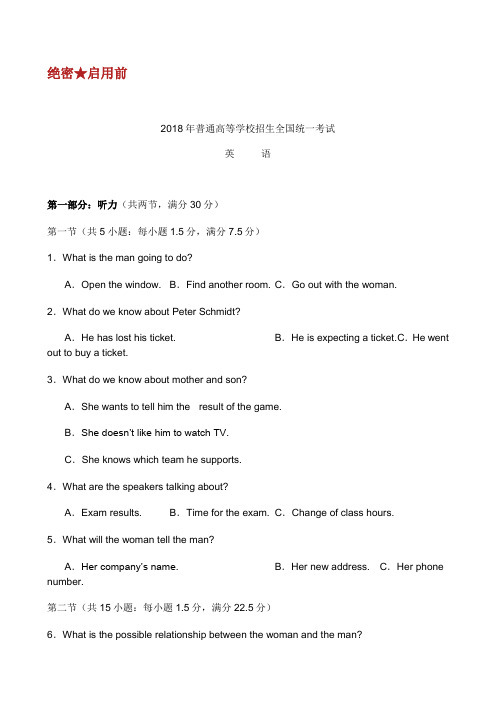
绝密★启用前2018年普通高等学校招生全国统一考试英语第一部分:听力(共两节,满分30分)第一节(共5小题:每小题1.5分,满分7.5分)1.What is the man going to do?A.Open the window. B.Find another room. C.Go out with the woman.2.What do we know about Peter Schmidt?A.He has lost his ticket. B.He is expecting a ticket. C.He went out to buy a ticket.3.What do we know about mother and son?A.She wants to tell him the result of the game.B.She doesn’t like him to watch TV.C.She knows which team he supports.4.What are the speakers talking about?A.Exam results. B.Time for the exam. C.Change of class hours.5.What will the woman tell the man?A.Her company’s name.B.Her new address. C.Her phone number.第二节(共15小题:每小题1.5分,满分22.5分)6.What is the possible relationship between the woman and the man?A.Wife and husband. B.Doctor and patient. C.Boss and secretary 7.What does the woman think about the man?A.He is not good to the children.B.He is not telling the truth.C.He sleeps too much.8.Where does the woman want to go?A.An office. B.A fruit shop. C.A police station. 9.What does the woman have to do now?A.Wait for Mark at the crossroads.B.Walk ahead and turn right.C.Walk a little way back.10.What exactly does the man want to find out?A.What people think of the bus service.B.How many people are using the bus service.C.Which group of people use the bus service most often.11.What does the woman say about the bus service?A.The distance between bus stops is too long.B.The bus timetables are full of mistakes.C.Buses are often not on time.12.Why does the woman say her husband is fortunate?A.He often goes to work in a friend’s car.B.He doesn’t need to go shopping by bus.C.He lives close to the bus station.13.What is the probable relationship between the two speakers?A.Salesperson and customerB.Old school friendsC.Fellow workers14.What do we know about the woman?A.She is fond of her work. B.She is tired of traveling. C.She is interested in law.15.What is the man?A.A company manager. B.A salesperson. C.A lawyer.16.Why does the woman ask for the man’s address?A.To send him a book.B.To get together with him.C.To repair something at his home.17.What is the aim of the program?A.To keep trainees in shape.B.To improve public relations.C.To develop leadership skills.18.Which of the following will the trainess be doing during the program?A.Attenling lectures on managementB.Preparing reports for the company.C.Making plans for a journey.19.How long will the program last?A.8 days B.12 days C.20 days.20.If people want to join the program, what should they do after the meeting?A.Take a pre-test B.Pay for the program. C.Sign on a piece of paper.第二部分:英语知识运用(共两节,满分45分)第一节:单项填空(共15小题:每小题1分,满分15分)21.Don’t be afraid of asking for help it is needed.A.unless B.since C.although D.when22.A cook will be immediately fired if he is found in the kitchen.A.smoke B.smoking C.to smoke D.smoked23.Allen had to call a taxi because the box was to carry all the way home.A.much too heavy B.too much heavy C.heavy too much D.too heavy much24.—Sorry, Joe, I didn’t mean to…—Don’t call me “Joe”. I’m Mr Parker to you, and you forget it!A.do B.didn’t C.did D.don’t25.If anybody calls, tell them I’m out, and ask them to their name and address.A.pass B.write C.take D.leave26.The sign reads “In case of fire, break the glass and push red button.”A.不填;a B.不填;the C.the; the D.a;a27.All morning as she waited for the medical report from the doctor, hernervouseness .A.has grown B.is growing C.grew D.had grown28.A left luggage office is a place where bags be left for a short time, especially at a railway station.A.should B.can C.must D.will29.We’re going to the bookstore in John’s car. You can come with us you can meet us there later.A.but B.and C.or D.then30.Why don’t you put the meat in the fridge? It will fresh for several days.A.be stayed B.stay C.be staying D.have stayed31.News reports say peace talks between the two countries with no agreement reached.A.have broken down B.have broken out C.have broken in D.have broken up32.—There’s coffee and tea: you can have .—Thanks.A.either B.each C.one D.it33.—Susan, go and join your sister cleaning the yard.—Why ? John is sitting there doing nothing.A.him B.he C.I D.me34.The old couple have been married for 40 years and never once with each other.A.they had quarreled B.they have quarreledC.have they quarreled D.had they quarreled35.—I think you should phone Jenny and say sorry to her.— .It was her fault.A.No way B.Not possible C.No chance D.Not at all第二节:完形填空(共20小题:每小题1.5分,满分30分)阅读下面短文,掌握其大意,然后从36—55各题所给的四个选项(A、B、C和D)中,选出最佳选项。
2018年高考英语全国2卷(附答案)
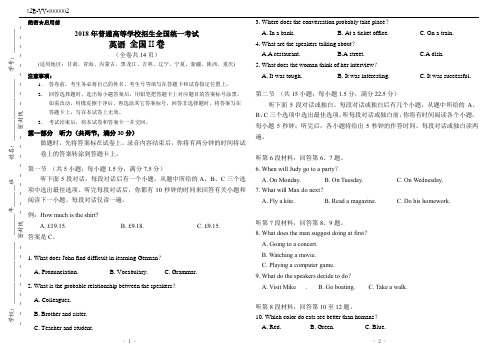
学校:____________________ _______年_______班 姓名:____________________ 学号:________- - - - - - - - - 密封线 - - - - - - - - - 密封线 - - - - - - - - -绝密★启用前2018年普通高等学校招生全国统一考试英语 全国II 卷(全卷共14页)(适用地区:甘肃、青海、内蒙古、黑龙江、吉林、辽宁、宁夏、新疆、陕西、重庆) 注意事项:1.答卷前,考生务必将自己的姓名、考生号等填写在答题卡和试卷指定位置上。
2. 回答选择题时,选出每小题答案后,用铅笔把答题卡上对应题目的答案标号涂黑。
如需改动,用橡皮擦干净后,再选涂其它答案标号,回答非选择题时,将答案写在答题卡上,写在本试卷上无效。
3.考试结束后,将本试卷和答案卡一并交回。
第一部分 听力(共两节,满分30分)做题时,先将答案标在试卷上。
录音内容结束后,你将有两分钟的时间将试卷上的答案转涂到答题卡上。
第一节 (共5小题;每小题1.5分,满分7.5分)听下面5段对话。
每段对话后有一个小题,从题中所给的A 、B 、C 三个选项中选出最佳选项。
听完每段对话后,你都有10秒钟的时间来回答有关小题和阅读下一小题。
每段对话仅读一遍。
例:How much is the shirt?A. £19.15.B. £9.18.C. £9.15.答案是C 。
1. What does John find difficult in learning German ? A. Pronunciation.B. Vocabulary.C. Grammar.2. What is the probable relationship between the speakers ? A. Colleagues. B. Brother and sister. C. Teacher and student.3. Where does the conversation probably take place ?A. In a bank.B. At a ticket office.C. On a train. 4. What are the speakers talking about ? A.A restaurant. B.A street.C.A dish.5. What does the woman think of her interview ?A. It was tough.B. It was interesting.C. It was successful.第二节 (共15小题;每小题1.5分,满分22.5分)听下面5段对话或独白。
2018高考全国卷Ⅱ英语试题[版含答案解析]
![2018高考全国卷Ⅱ英语试题[版含答案解析]](https://img.taocdn.com/s3/m/9e140c5c1eb91a37f1115c83.png)
2018年普通高等学校招生全国统一考试英语(考试时间:120分钟试卷满分:150分)第二部分阅读理解(共两节,满分40分)第一节 (共15小题;每小题2分,满分30分)阅读下列短文,从每题所给的A、B、C和D四个选项中,选出最佳选项。
ASummer ActivitiesStudents should read the list with their parents/careers, and select two activities theywould like to do. Forms will be available in school and online for them to indicate their choices and return to school. Before choices are finalised, parents/careers will be asked tosign to confirm their child’s choices.21.Which activity will you choose if you want to go camping?A.OUT.B.WBP.C.CRF.D.POT.22.What will the students do on Tuesday with Mrs. Wilson?A. Travel to London.B. See a parade and fireworks.C. Tour central Paris.D. Visit the WWI battlefields.23.How long does Potty about Potter last?A. Two days.B. Four days.C. Five days.D. One week.BMany of us love July because it’s the month when nature’s berries and stone fruits are in abundance. These colourful and sweet jewels form British Columbia’s fields are little powerhouses of nutritional protection.Of the common berries, strawberries are highest in vitamin C, although, because of their seeds, raspberries contain a little more protein (蛋白质), iron and zinc (not that fruits have much protein). Blueberries are particularly high in antioxidants (抗氧化物质). The yellow and orange stone fruits such as peaches are high in the carotenoids we turn into vitamin A and which are antioxidants. As for cherries (樱桃), they are so delicious who cares? However, they are rich in vitamin C.When combined with berries of slices of other fruits, frozen bananas make an excellent base for thick, cooling fruit shakes and low fat “ice cream”. For this purpose, select ripe bananas for freezing as they are much sweeter. Remove the skin and place them in plastic bags or containers and freeze. If you like, a squeeze of fresh lemon juice on the bananas will prevent them turning brown. Frozen bananaswill last several weeks, depending on their ripeness and the temperature of the freezer.If you have a juicer, you can simply feed in frozen bananas and some berries or sliced fruit. Out comes a “soft-serve” creamy dessert, to be eaten ri ght away. This makes a fun activity for a children’s party; they love feeding the fruit and frozen bananas into the top of the machine and watching the ice cream come out below.24. What does the author seem to like about cherries?A. They contain protein.B. They are high in vitamin A.C. They have a pleasant taste.D. They are rich in antioxidants.25. Why is fresh lemon juice used in freezing bananas?A. To make them smell better.B. To keep their colour.C. To speed up their ripening.D. To improve their nutrition.26. What is “a juicer” in the last paragraph?A. A dessert.B. A drink.C. A container.D. A machine.27. From which is the text probably taken?A. A biology textbook.B. A health magazine.C. A research paper.D. A travel brochure.CTeens and younger children are reading a lot less for fun, according to a Common Sense Media report published Monday.While the decline over the past decade is steep for teen readers, some data in the report shows that reading remains a big part of many children’s lives, and indicates how parents might help encourage more reading.According to the report’s key findings, “the proportion (比例) who say they ‘hardly ever’ read for fun has gone from 8 percent of 13-year-olds and 9 percent of 17-year-olds in 1984 to 22 percent and 27 percent respectively today.”The report data shows that pleasure reading levels for younger children, ages 2—8, remain largely the same. But the amount of time spent in reading each session has declined, from closer to an hour or more to closer to a half hour per session. When it comes to technology and reading, the report does little to counsel(建议) parents looking for data about the effect of e-readers and tablets on reading. It does point out that many parents still limit electronic reading, mainly due to concerns about increased screen time.The most hopeful data shared in the report shows clear evidence of parents serving as examples and important guides for their kids when it comes to reading. Data shows that kids and teens who do read frequently, compared to infrequent readers, have more books in the home, more books purchased for them, parents who read more often, and parents who set aside time for them to read.As the end of school approaches, and school vacation reading lists loom(逼近) ahead, parents might take this chance to step in and make their own summer reading list and plan a family trip to the library or bookstore.28. What is the Common Sense Media report probably about?A. Children’s reading habits.B. Quality of children’s books.C. Children’s after-class activities.D. Parent-child relationships.29. Where can you find the data that best supports "children are reading a lot less for fun"?A. In paragraph 2.B. In paragraph 3.C. In paragraph 4.D. In paragraph 5.30. Why do many parents limit electronic reading?A. E-books are of poor quality.B. It could be a waste of time.C. It may harm children’s health.D. E-readers are expensive.31. How should parents encourage their children to read more?A. Act as role models for them.B. Ask then to write book reports.C. Set up reading groups for them.D. Talk with their reading class teachers.DWe’ve all been there: in a lift, in line at the bank or on an airplane, surrounded by people who are, like us, deeply focused on their smartphones or, worse, struggling with the uncomfortable silence.What’s the problem? It’s possible that we all have compromised conversational intelligence. It’s more likely that none of us start a conversation because it’s awkward and challenging, or we think it’s annoying and unnecessary. But the next time you find yourself among strangers, consider that small talk is worth the trouble. Experts say it’s an invaluable soci al practice that results in big benefits.Dismissing small talk as unimportant is easy, but we can’t forget that deep relationships wouldn’teven exist if it weren’t for casual conversation. Small talk is the grease(润滑剂) for social communication, says Bernardo Carducci, director of the Shyness Research Institute at Indiana University Southeast. "Almost every great love story and each big business deal begins with small talk," he explains. "The key to successful small talk is learning how to connect with others, not just communicate with them."In a 2014 study, Elizabeth Dunn, associate professor of psychology at UBC, invited people on their way into a coffee shop. One group was asked to seek out an interaction(互动) with its waiter; the other, to speak only when necessary. The results showed that those who chatted with their server reported significantly higher positive feelings and a better coffee shop experience. "It’s not that talking to the waiter is better than talking to your husband," says Dunn. "Butinteractions with peripheral(边缘的) members of our social network matter for our well-being also."Dunn believes that people who reach out to strangers feel a significantly greater sense of belonging, a bond with others. Carducci believes developing such a sense of belonging starts with small talk. "Small talk is the basis of good manners," he says.32. What phenomenon is described in the first paragraph?A. Addiction to smartphones.B. Inappropriate behaviours in public places.C. Absence of communication between strangers.D. Impatience with slow service.33. What is important for successful small talk according to Carducci?A. Showing good manners.B. Relating to other people.C. Focusing on a topic.D. Making business deals.34. What does the coffee-shop study suggest about small talk?A. It improves family relationships.B. It raises people’s confidence.C. It matters as much as a formal talk.D. It makes people feel good.35. What is the best title for the text?A. Conversation CountsB. Ways of Making Small TalkC. Benefits of Small TalkD. Uncomfortable Silence第二节 (共5小题;每小题2分,满分10分)根据短文内容,从短文后的选项中选出能填入空白处的最佳选项。
2018年英语高考全国卷二(含答案)

绝密★启用前2018年普通高等学校招生全国统一考试英语(考试时间:120分钟试卷满分:150分)1.2.3.例:1.WhatdoesJohnfinddifficultinlearningGerman?A.Pronunciation.B.Vocabulary.C.Grammar.2.Whatistheprobablerelationshipbetweenthespeakers?A.Colleagues.B.Brotherandsister.C.Teacherandstudent.3.Wheredoestheconversationprobablytakeplace?A.Inabank.B.Ataticketoffice.C.Onatrain.4.Whatarethespeakerstalkingabout?A.Arestaurant.B.Astreet.C.Adish.5.Whatdoesthewomanthinkofherinterview?给出5听第听第78.Whatdoesthemansuggestdoingatfirst?A.Goingtoaconcert.B.Watchingamovie.C.Playingacomputergame.9.Whatdothespeakersdecidetodo?A.VisitMike.B.Goboating.C.Takeawalk.听第8段材料,回答第10至12题。
10.Whichcolordocatsseebetterthanhumans?A.Red.B.Green.C.Blue.11.Whydocatsbringdeadbirdshome?A.Toeattheminasafeplace.B.Toshowofftheirhuntingskills.听第9A.He’sclever.B.He’squiet.C.He’sbrave.听第10段材料,回答第17至20题。
00015英语二2018年10月真题+解析+作文

2018年10月高等教育自学考试全国统一命题考试英语(二)试卷(课程代码00015)本试卷共8页。
满分100分,考试时间150分钟。
考生答题注意事项:1.本卷所有试题必须在答题卡上作答。
答在试卷上无效,试卷空白处和背面均可作草稿纸。
2.第一、二部分在“选择题答题区”作答。
必须对应试卷上的题号使用2B铅笔将3.第三一b部分在&E选择题答题区〃作答。
必须注明大、小题号.使用0.5毫米黑色字迹签字笔作答。
4.合理安排答题空间,超出答题区域无效。
第一部分:阅读判断01-10题,每题1分,共10分)下面的短文后列出了 10个句子,请根据短文的内容对每个句子作出判断:如果该句提供的是正确信息,选择A;如果该旬提供的是错误信息,选择B;如果该句的信息文中没有提及,选择C。
在答题卡相应位置上将答案选项涂黑。
The British SummerBritain is well known for its rainy climate. People joke that even in the summer time the country never gets any sun and that the skies stay disappointingly grey even during the months of July and AugustLast summer though, it was so hot that people could hardly believe it. British people weren,t used to such high temperatures, so every day on the news there were stories about people struggling to work in such unusual weather conditions. Radio and television programmes also reminded everyone to drink more water and not to stay too long in the sun.:When the sun comes out, British people tend to spend time in their garden ifjthey have one. It's common to invite friends and neighbours around for a barbecue, where everyone sits outside and eats food like grilled meat(烤肉 and salads. There, s always a back-up plan in case of rain though, and the meal sometimes has to be cooked in the kitchen and eaten indoorsPeople also spend a lot of time in parks during the summer, having picnics or playing sports. In every green area, there's always at least one ice cream van, a kind of car that plays children' s music and sells ice creamsTowns like Blackpool and Brighton are popular for their beaches and amusement arcades(游乐场).People go there to swim, sunbathe and eat fish and chips. Thewater can be quite cold, though, and that's why quite a lot of people prefer to go abroad for their summer holiday instead. Popular destinations include Spain, Germany and France: all countries that promise a lot of sunshine!1.There is little sunshine in Britain in summer.A.. TrueB. False C Not Given2.* British people like to tell jokes about each otherA.TrueB. False C Not Given3.It was unusually hot last summer in BritainA.TrueB. False C Not Given4.British people enjoyed the high temperatures of last summer.A. TrueB. False C Not Given10. People go to Spain in summer toA. TrueB. False C Not Given 第二部分:阅渎选择(Mil 〜15题,每题2分,共10分) 阅渎下面短文,请从短文后所给各题的4个选项(A 、B 、C 、D )中选出1个最佳 选项,并在答题卡相应位置上将该项涂黑。
- 1、下载文档前请自行甄别文档内容的完整性,平台不提供额外的编辑、内容补充、找答案等附加服务。
- 2、"仅部分预览"的文档,不可在线预览部分如存在完整性等问题,可反馈申请退款(可完整预览的文档不适用该条件!)。
- 3、如文档侵犯您的权益,请联系客服反馈,我们会尽快为您处理(人工客服工作时间:9:00-18:30)。
绝密★启用前2018全国统一考试高考(全国卷II)真题英语(考试时间:120分钟试卷满分:150分)注意事项:1. 答卷前,考生务必将自己的姓名、准考证号填写在答题卡上。
2. 作答时,务必将答案写在答题卡上,写在本试卷及草稿纸上无效。
3. 考试结束后,将本试卷和答题卡一并交回。
第一部分听力(共两节,满分30分)做题时,先将答案标在试卷上。
录音内容结束后,你将有两分钟的时间将试卷上的答案转涂到答题卡上。
第一节(共5小题;每小题1.5分,满分7.5分)听下面5短对话,每段对话后有一个小题,从题中给的A、B、C三个选项中选出最佳选项。
听完每段对话后,你都有10秒钟的时间来回答有关小题和阅读下一小题。
每段对话仅读一遍。
例:How much is the shirt?A.£19.15.B.£9.18.C.£9.15.1.What does John find difficult in learning German?A.Pronunciation.B.Vocabulary.C.Grammar.2.What is the probable relationship between the speakers?A.Colleagues.B.Brother and sister.C.Teacher and student.3.Where does the conversation probably take place?A. In a bank.B. At a ticket office.C. On a train.4. What are the speakers talking about?A.A restaurant.B.A street.C.A dish.5.What does the woman think of her interview?A.It was tough.B.It was interesting.C.It was successful.第二节(共15小题;每小题1.5分,满分22.5分)听下面5段对话或独白,每段对话或独白后有几个小题,从题中所给的A、B、C三个选项中选出最佳选项。
听每段对话或独白前,你将有时间阅读各个小题,每小题5秒钟;听完后,各小题将给出5秒钟的作答时间。
每段对话或独白读两遍。
听第6段材料,回答第6、7题。
6.When will Judy go to a party?A.On Monday.B.On Tuesday.C.On Wednesday.7.What will Max do next?A.Fly a kite.B.Read a magazine.C.Do his homework.听第7段材料,回答第8、9题。
8.What does the man suggest doing at first?A.Going to a concert.B.Watching a movie.C.Playing a computer game.9.What do the speakers decide to do?A.Visit Mike .B.Go boating.C.Take a walk.听第8段材料,回答第10至12题。
10.Which color do cats see better than humans?A.Red.B.Green.C.Blue.11.Why do cats bring dead birds home?A.To eat them in a safe place.B.To show off their hunting skills.C.To make their owners happy.12.How does the man sound at the end of the conversation?A.Grateful.B.Humorous.C.Curious. 听第9段材料,回答第13至16题。
13.Who is Macy?A.Ed’s mother.B.Ed’s teacher.C.Ed’s friend.14.How does Ed usually go to kindergarten?A.By car.B.On foot.C.By bus.15.What does Ed enjoy doing at the kindergarten?A.Telling stories.B.Singing songs .C.Playing with others.16.What do the teachers say about Ed?A.He’s clever.B.He’s quiet.C.He’s brave.听第10段材料,回答第17至20题。
17.At what age did Emily start learning ballet?A.Five.B.Six.C.Nine.18.Why did Emily move to Toronto?A.To work for a dance school.B.To perform at a dance theater.C.To learn contemporary dance.19.Why did Emily quit dancing?A.She was too old to dance.B.She failed to get a scholarship.C.She lost interest in it.20.How does Emily feel about stopping training?A.She’s pleased.B.She’s regretful.C.She’s upset第二部分阅读理解(共两节,满分40分)第一节 (共15小题;每小题2分,满分30分)阅读下列短文,从每题所给的A、B、C和D四个选项中,选出最佳选项。
ASummer ActivitiesStudents should read the list with their parents/careers, and select two activities theywould like to do. Forms will be available in school and online for them to indicate their choices and return to school. Before choices are finalised, parents/careers will be asked tosign to confirm their child’s choices.A.OUT.B.WBP.C.CRF.D.POT.22.What will the students do on Tuesday with Mrs. Wilson?A. Travel to London.B. See a parade and fireworks.C. Tour central Paris.D. Visit the WWI battlefields.23.How long does Potty about Potter last?A. Two days.B. Four days.C. Five days.D. One week.BMany of us love July because it’s the month when nature’s berries and stone fruits are in abundance. These colourful and sweet jewels form British Columbia’s fields are little powerhouses of nutritional protection.Of the common berries, strawberries are highest in vitamin C, although, because of their seeds, raspberries contain a little more protein (蛋白质), iron and zinc (not that fruits have much protein). Blueberries are particularly high in antioxidants (抗氧化物质). The yellow and orange stone fruits such as peaches are high in the carotenoids we turn into vitamin A and which are antioxidants. As for cherries (樱桃), they are so delicious who cares? However, they are rich in vitamin C.When combined with berries of slices of other fruits, frozen bananas make an excellent base for thick, cooling fruit shakes and low fat “ice cream”. For this purpose, select ripe bananas for freezing as they are much sweeter. Remove the skin and place them in plastic bags or containers and freeze. If you like, a squeeze of fresh lemon juice on the bananas will prevent them turning brown. Frozen bananas will last several weeks, depending on their ripeness and the temperature of the freezer.If you have a juicer, you can simply feed in frozen bananas and some berries or sliced fruit. Out comes a “soft-serve” creamy dessert, to be eaten right away. This makes a fun activity for a children’s party; they love feeding the fruit and frozen bananas into the top of the machine and watching the ice cream come out below.24. What does the author seem to like about cherries?A. They contain protein.B. They are high in vitamin A.C. They have a pleasant taste.D. They are rich in antioxidants.25. Why is fresh lemon juice used in freezing bananas?A. To make them smell better.B. To keep their colour.C. To speed up their ripening.D. To improve their nutrition.26. What is “a juicer” in the last paragraph?A. A dessert.B. A drink.C. A container.D. A machine.27. From which is the text probably taken?A. A biology textbook.B. A health magazine.C. A research paper.D. A travel brochure.CTeens and younger children are reading a lot less for fun, according to a Common Sense Media report published Monday.While the decline over the past decade is steep for teen readers, some data in the report shows that reading remains a big part of many children’s lives, and indicates how parents might help encourage more reading.According to the report’s key findings, “the proportion (比例) who say they ‘hardly ever’ read for fun has gone from 8 percent of 13-year-olds and 9 percent of 17-year-olds in 1984 to 22 percent and 27 percent respectively today.”The report data shows that pleasure reading levels for younger children, ages 2—8, remain largely the same. But the amount of time spent in reading each session has declined, from closer to an hour or more to closer to a half hour per session.When it comes to technology and reading, the report does little to counsel(建议) parents looking for data about the effect of e-readers and tablets on reading. It does point out that many parents still limit electronic reading, mainly due to concerns about increased screen time.The most hopeful data shared in the report shows clear evidence of parents serving as examples and important guides for their kids when it comes to reading. Data shows that kids and teens who do read frequently, compared to infrequent readers, have more books in the home, more books purchased for them, parents who read more often, and parents who set aside timefor them to read.As the end of school approaches, and school vacation reading lists loom(逼近) ahead, parents might take this chance to step in and make their own summer reading list and plan a family trip to the library or bookstore.28. What is the Common Sense Media report probably about?A. Children’s reading habits.B. Quality of children’s books.C. Children’s after-class activities.D. Parent-child relationships.29. Where can you find the data that best supports "children are reading a lot less for fun"?A. In paragraph 2.B. In paragraph 3.C. In paragraph 4.D. In paragraph 5.30. Why do many parents limit electronic reading?A. E-books are of poor quality.B. It could be a waste of time.C. It may harm children’s health.D. E-readers are expensive.31. How should parents encourage their children to read more?A. Act as role models for them.B. Ask then to write book reports.C. Set up reading groups for them.D. Talk with their reading class teachers.DWe’ve all been there: in a lift, in line at the bank or on an airplane, surrounded by people who are, like us, deeply focused on their smartphones or, worse, struggling with the uncomfortable silence.What’s the problem? It’s possible that we all have compromised conversational intelligence. It’s more likely that none of us start a conversation because it’s awkward and challenging, or we think it’s annoying and unnecessary. But the next time you find y ourself among strangers, consider that small talk is worth the trouble. Experts say it’s an invaluable social practice that results in big benefits.Dismissing small talk as unimportant is easy, but we can’t forget that deep relationships wouldn’teven e xist if it weren’t for casual conversation. Small talk is the grease(润滑剂) for social communication, says Bernardo Carducci, director of the Shyness Research Institute at Indiana University Southeast. "Almost every great love story and each big business deal begins with small talk," he explains. "The key to successful small talk is learning how to connect with others, not just communicate with them."In a 2014 study, Elizabeth Dunn, associate professor of psychology at UBC, invited people on their way into a coffee shop. One group was asked to seek out an interaction(互动) with its waiter; the other, to speak only when necessary. The results showed that those who chatted with their server reported significantly higher positive feelings and a better coffee shop experience. "It’s not that talking to the waiter is better than talking to your husband," says Dunn. "But interactions with peripheral(边缘的) members of our social network matter for our well-being also."Dunn believes that people who reach out to strangers feel a significantly greater sense of belonging, a bond with others. Carducci believes developing such a sense of belonging starts with small talk. "Small talk is the basis of good manners," he says.32. What phenomenon is described in the first paragraph?A. Addiction to smartphones.B. Inappropriate behaviours in public places.C. Absence of communication between strangers.D. Impatience with slow service.33. What is important for successful small talk according to Carducci?A. Showing good manners.B. Relating to other people.C. Focusing on a topic.D. Making business deals.34. What does the coffee-shop study suggest about small talk?A. It improves family relationships.B. It raises people’s confidence.C. It matters as much as a formal talk.D. It makes people feel good.35. What is the best title for the text?A. Conversation CountsB. Ways of Making Small TalkC. Benefits of Small TalkD. Uncomfortable Silence第二节 (共5小题;每小题2分,满分10分)根据短文内容,从短文后的选项中选出能填入空白处的最佳选项。
